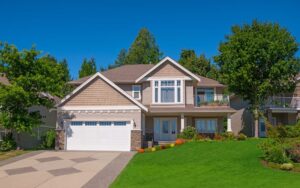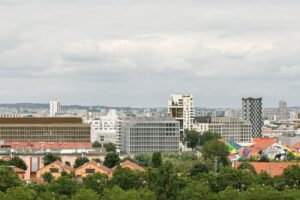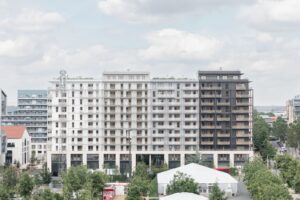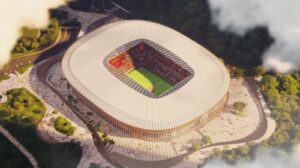Fellenoord 15 by UnStudio
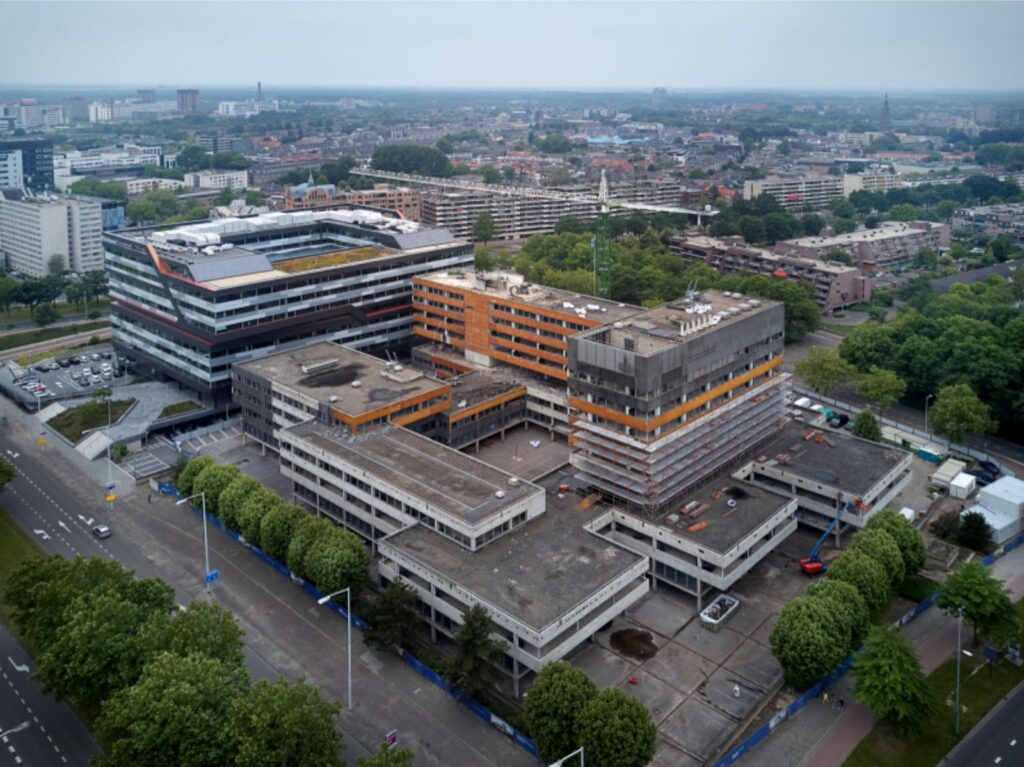
UNStudio’s design for the refurbishment of a former bank headquarters, ‘Fellenoord 15’, in the Dutch city of Eindhoven, was commissioned by Edge and holistically fuses a healthy and flexible work concept with a highly sustainable, tech-enabled building.
The recently completed refurbishment has fully transformed the former Rabobank headquarters into a contemporary, 32,000 m2 government office building, equipped with a dense network of sensors and advanced applications that will significantly improve its post-occupancy conditions and building management. Retaining the clock tower volume was a particularly important element of the transformation.
The clock has long formed a recognisable and much used element of the building for the residents of Eindhoven. In recent years, the negative environmental impact of the construction industry has significantly changed how we view the demolition of existing buildings in favour of new builds. Renovating or redeveloping existing building stock and extending the life span of our buildings is now favoured as a more sustainable solution, while also ensuring the retention of inherent historical or local significance.
In the case of Fellenoord 15, the existing building previously stood as a difficult-to-access bastion within the city and could no longer accommodate a changing and expanding workforce; the interior was disconnected and fragmented, with the result that colleagues had to work in isolation from one another. However, Fellenoord 15 had a robust shell, which meant that the structure could be retained, rather than demolished.
This decision aimed to save about 40% of the CO2 footprint compared to a new build. Sustainable techniques were also employed in the demolition of the former facade, setting the foundation for a truly sustainable development. The design achieved a BREEAM-Excellent sustainability rating. The transformed building utilises geothermal heating and cooling, water-based climate ceilings and solar panels, in addition to the use of natural materials such as stone.
As with many of UNStudio’s designs, the floor plans are optimised to make maximum use of views and daylight, positively impacting the building’s energy balance and the comfort and productivity of its occupants. In addition, the choice of plant species in the landscape design, alongside the addition of insect hotels, bat boxes and nesting boxes, supports local biodiversity.
Tech-enabled
Benefitting from the expertise of Edge, the building is equipped with a variety of smart technologies. The use of location sensors and intelligent data infrastructure provides insight into the behavior of the users, which contributes to the reduction of energy consumption and improves the efficient use of spaces.
By tracking energy usage patterns, identifying inefficiencies, and making real-time adjustments, these sensors help to create more sustainable and comfortable workplaces that also enable the control of individual work environments. The result is a new, flexible office building that is designed to adapt to the current – and future – needs of employees.
Public Activation
UNStudio’s design activates the public space by revamping the former Rabobank building into an open facing building that now enjoys a strong relationship with its surroundings. By designing a new entrance and removing a parking lot on the side of the building facing the station, Fellenoord 15 now connects more seamlessly with the surrounding urban fabric.
Subtle articulations to the massing at various strategic positions further open the building up to its surroundings. From a distance, the building has an unassuming appearance that is enhanced by large details such as voids, windows, roof articulation and a clearly recognisable entrance. In the immediate vicinity, the building’s perforations become visible and a subtle tactility and layering is created by the expanded mesh cladding.
These design elements contribute to a subtle moiré effect in the plinth due to the double layer of expanded metal mesh. The new entrance to the building connects the street to the atrium via a large, semi-public staircase. The existing fragmented building masses are seamlessly joined in the new design through a continuous landscape of flexible office floors, connecting the previously disparate spaces.
The new office floors are designed based on the idea of a gradient of activity: the central heart of the interior bustles with activity, while quiet workplaces are located alongside the facades on all floors, creating an ideal workplace for a wide variety of employees’ needs. Source by UnStudio.
Location: Fellenoord 15, Eindhoven, Netherlands
Architect: UNStudio
Project Team: Ben van Berkel with Arjan Dingsté, Marianthi Tatari, Marc Hoppermann, Jaap-Willem Kleijwegt and Bruno Peris, Piotr Kluszczynski, Thys Schreij, Cristina Bolis Krishna Duddumpudi, Yamoh Rasa, Ryan Henriksen, Ed van Vulpen
Structure: PBT
MEP: Deerns
Fire Life Safety, Building Physics and sustainability: DGMR
Cost Consultant: BBN
Interior architect: OTH
Contractor: Jongen Bouwpartners
Client: Edge (At time of commission known as OVG real estate)
Building surface: 32.000m2
Year: 2023
Photographs: Hans Wilschut, Evabloem, Courtesy of UNStudio


